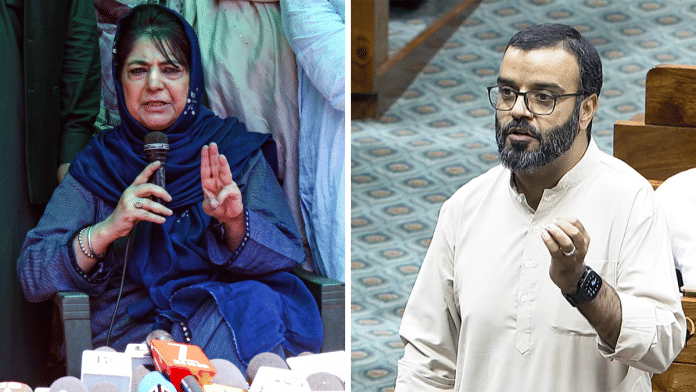Thank you dear subscribers, we are overwhelmed with your response.
Your Turn is a unique section from ThePrint featuring points of view from its subscribers. If you are a subscriber, have a point of view, please send it to us. If not, do subscribe here: https://theprint.in/subscribe/
In politics, pretension often arrives dressed as principle. The difference between conviction and convenience is not always visible in the speeches or the slogans but in the silences that follow them. Kashmir’s political theatre has long been crowded with actors who master the choreography of resistance while keeping one foot firmly in the corridors of accommodation. Among them, two figures stand out- not because they oppose each other, but because their opposition mirrors each other so perfectly. One speaks in the tone of moral sanctity, the other in the language of sentimental defiance; one invokes history, the other invokes pain; yet both sustain the same broken order that has turned dissent into performance and compromise into culture. They are, in the truest sense, the two sides of the same coin- Ruhullah Mehdi and Mehbooba Mufti.
Both have perfected the art of being in opposition without ever leaving the system they condemn. Mehdi’s dissent is polished, intellectual, rehearsed in the tone of a scholar who wishes to be mistaken for a saint. His resistance has the elegance of a well-written speech, but it lacks the risk that turns rhetoric into reality. He performs rupture while carefully keeping his chair dry from the storm he describes. Mehbooba’s defiance, on the other hand, is draped in emotional immediacy- the trembling voice, the public lament, the constant invocation of betrayal. Yet, beneath the theatrics of anguish lies the same calculation that guides Mehdi’s polished sermons: the will to remain relevant in a political order that rewards gesture over substance. Both have discovered that in Kashmir’s political marketplace, moral outrage sells better than moral courage.
They occupy different registers of the same deceit. Mehdi speaks to the fatigued intellectual class that still yearns for ethical vocabulary; Mehbooba speaks to the sentimental crowd that confuses tears with truth. Both offer their audiences an illusion of resistance- he, the illusion of reasoned defiance; she, the illusion of wounded innocence. Their methods differ, but their ends converge: to remain the face of protest while ensuring the system remains intact enough to house their careers. The danger they represent is not that they are insincere- insincerity in politics is an old story- but that their brand of sincerity has become a shield for survival.
What binds them is not ideology but the shared comfort of contradiction. Mehbooba once claimed to have been deceived by Delhi’s duplicity, but the deceived does not return to dine with the deceiver unless deception is profitable. Her post-2019 defiance is a spectacle without consequence- words against power, delivered in full awareness that power finds such words useful. Mehdi’s protests against selective injustices- reservations, symbolic betrayals- follow the same pattern. He shouts where it is safe to shout, retreats where silence pays better dividends. Both have mastered the language of defiance without ever disturbing the architecture of obedience.
The political tragedy of Kashmir today is that such figures have become the custodians of its conscience. They manufacture dissent within limits, curate outrage within boundaries, and call it courage. The parties they represent- the one drenched in the nostalgia of dynastic entitlement, the other in the self-pity of lost grandeur- no longer produce conviction; they produce characters. Mehdi is the philosopher in residence, reciting lines about principle while ensuring his robes never touch the mud. Mehbooba is the tragic heroine, forever betrayed yet forever bargaining. Together, they complete the farce of moral politics.
Theirs is not the resistance of risk-takers but of rehearsed actors. They remind the people of what was lost, not to reclaim it, but to remind themselves that they still have a stage to stand on. Their dissent functions like incense in a dying shrine- it fills the air with fragrance while concealing the rot beneath. Mehdi’s critique of his own party’s moral decay and Mehbooba’s lament over Delhi’s treachery are twin performances of the same script: both seek redemption without renunciation, legitimacy without loss.
What makes them dangerous is not their hypocrisy alone but the erosion of discernment they cause. They blur the line between genuine resistance and managed opposition, between the courage to confront and the comfort to perform. Their existence normalises a form of politics where speaking against power becomes an industry, and suffering becomes a strategy. They embody a new kind of political economy- where moral currency is traded for symbolic gain, and public memory is shaped not by sacrifice but by spectacle.
In the end, what separates them from the very order they critique? Nothing but tone. Mehdi whispers in the language of principle; Mehbooba weeps in the language of pain. Yet both derive their strength from the same decaying system, both drink from the same poisoned well, and both feed on the people’s longing for truth. Theirs is the politics of reflection without rupture, of conscience without consequence.
History, however, does not remember the performers of protest; it remembers those who risked everything to make protest real. Mehdi and Mehbooba have turned protest into profession and conscience into commodity. They are not wolves or saviours- they are the mirror and its reflection, each validating the other’s illusion. And as long as such figures dominate the political stage, Kashmir will continue to live under the shadow of voices that sound brave but act tame, rebels who never leave the palace, and victims who never stop negotiating with their fate.
These pieces are being published as they have been received – they have not been edited/fact-checked by ThePrint.


